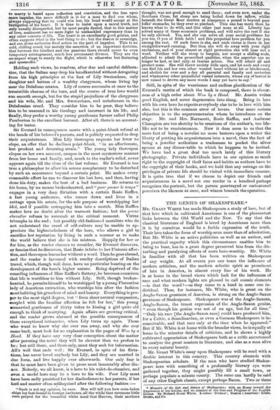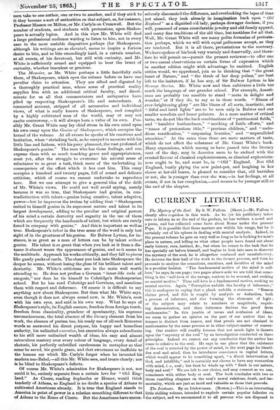THE GENIUS OF SHAKESPEARE.* Mn. GRANT WHITE has made Shakespeare
a study of love, but of that love which in cultivated Americans is one of the pleasantest links between the Old World and the New. To say that the classical literature of England is loved by Americans more than it is by ourselves would be a feeble expression of the truth. Their love takes the form of worship even more than of admiration. But Mr. White is an active politician as well as an author, and the practical sagacity which this circumstance enables him to bring to bear, has in a great degree preserved him from the dis- turbing and paralyzing effects of mere hero-worship. Mr. White is familiar with all that has been written on Shakespeare of any weight. At all events you can trace the influence of modern criticism, and the modern eclectic spirit so prominent of late in America, in almost every line of his work. He is at home in the broad views which look for the influences of race and what modern lights are pleased to call cosmic elements —is that the word ?—as they come to a head in some one in- dividual. Thus, for instance, Mr. White, who is great on the Anglo-Saxon greatness of America, is strong on the Anglo-Saxon greatness of Shakespeare. Shakespeare was of the Anglo-Saxons, Anglo-Saxon, the truest expression of the Anglo-Saxon genius, " even though his genius was not of an age, but for all time."
Only his race [the Anglo-Saxon race] could have produced him, for a Celtic, a Scandinavian, or even a German Shakespeare is in- conceivable, and that race only at the time when he appeared." But if Mr. White is at home with the broader views, he is equally at home in the minuter details of criticism, and 'he shows a highly cultivated appreciation of Shakespeare both as a critic accustomed to analyze the great masters in literature, and also as a man alive to every natural beauty.
Mr. Grant White's essay upon Shakespeare will be read with a double interest in this country. This country abounds with Shakespearian scholars. If the men who have studied Shakes- peare here with something of a professedly literary eye were gathered together, they might possibly fill a small town, or perhaps populate a minute county. The same can hardly be said of any other English classic, except perhaps Bacon. Two or three
• Memoirs of the Life and Genius of Shakespeare; with In ;Emu Marva Ate Expression of his Genies, and an Account of the Rise and frogmen of the English Drama By Richard Grant White. L nulon: Trbbner ; Boston (America): Little, Brown, and Co. men take to one author, one or two to another, and if they stick to it they become a sort of authorities on that subject, as, for instance, Professor Masson on Milton, or Mr. Carlyle on Cromwell. But the number of students, and students with pretensions, upon Shakes- peare is actually legion. And in this view Mr. White will find a large professional audience waiting to listen to him, not in every case in the most amiable disposition perhaps (for Shakespeare, although his writings are so elevated, seems to inspire a furious desire to bite, and to bite exceedingly hard, in a certain number, at all events, of his devotees), but still with curiosity, and Mr. White is sufficiently armed and equipped to bear the brunt of curiosity, whether truculent or gracious.
The Memoirs, as Mr. White perhaps a little fancifully calls them, of Shakespeare, which open the volume before us have one peculiar claim to attention. They are sifted and digested by a thoroughly practical man, whose sense of practical reality supplies him with an additional critical faculty, and discri- minate for us all that commentators and antiquaries have piled up respecting Shakespeare's life and antecedents. A connected account, stripped of all accessories and individual views, of what is really known of Shakespeare, and compiled by a highly cultivated man of the world, may or may not excite controversy, —it will always have a value of its own. Pos- sibly Mr. Grant White may lay chief stress in his own mind upon his own essay upon the Genius of Shakespeare, which occupies the kernel of the volume. At all events he speaks of his emotions and hesitation, when "shrinking back, as be essayed to measure with his little line and fathom, with his puny plummet, the vast profound of Shakespeare's genius." The man who has these feelings, and can express them with so much touching grace and appropriateness, must yet, after the struggle to overcome his natural sense of reluctance to so great a task, think more of the undertaking in consequence of the effort which it has cost him. This essay occupies a hundred and twenty pages, full of sound and delicate criticism, which of course we cannot undertake to reproduce here. But we can attempt to give a general idea of the drift of Mr. White's views. He could not well avoid saying, merely because it was so true, that Shakespeare had genius, in con- tradistinction with talent—genius being creative, talent adaptive, power—but he improves the truism by adding that " Shakespeare united in himself genius in its supremest nature and talent in its largest development, adding to the peculiar and original powers of his mind a certain dexterity and sagacity in the use of them which are frequently the handmaids of talent, but which are rarely found in company with genius." And this is important as well as true. Shakespeare's talent in the true sense of the word is only lost sight of in the greatness of his genius. Sir Bulwer Lytton, for in- stance, is as great as a man of letters can be by talent without genius. His talent is so great that when you look at it from a dis- tance it almost wears the appearance of genius, and so it seems to the multitude. Approach his works critically, and they fall to pieces like gaudy packs of cards. The closer you look into Shakespeare the deeper he seems, without losing the gloss bf his brilliant talent and dexterity. Mr. White's criticisms are in the main well worth attending to. He does not profess a German " inner-life code of exegesis," nor does he tie himself to Coleridge's Shakespearian school. But be has read Coleridge and Gervinus, and mentions them with respect and deference. Of course it is difficult to say anything new about Shakespeare. But then what Mr. White says, even though it does not always sound new, is Mr. White's, seen with his own eyes, and said in his own way. What he says of Shakespeare's style, its English essence, freedom from foreign touch, freedom from classicality, grandeur of spontaneity, his supreme unconsciousness, the total absence of the literary element from his work, the absence of purism too, his ready use of all such Romance words as answered his direct purpose, his happy and boundless audacity, his unlimited execution, but execution always subordinate to his still more unlimited wealth of ideas, his easy and almost miraculous mastery over every colour of language, every detail of rhetoric, his perfectly unbridled carelessness in metaphor so that sense be saved, his gentle grace, and that sweetness so ineffable to the human ear which Mr. Carlyle forgot when he invented his modern neo-Babel,—all this Mr. White sees, and treats clearly; nor is he blind to Shakespeare's defects.
Of course Mr. White's admiration for Shakespeare is not, nor could it be, entirely separate from a certain love for " Old Eng- land." As Cicero, reading Sophocles or Homer, would think tenderly of Athens, so England is no doubt a species of Athens to cultivated Americans already. It is true that England stands to America in point of power in a relation something different to that of Athens to the Rome of Cicero. But the Americans have uncon- aciously discounted the difference, and overlooking the lapse of time yet ahead, they look already in imagination back upon " OGZ England" as a dignified old lady, perhaps dowager duchess, if you will, possessed of some considerable jewelry and old family apparel, and many fine traditions of the old time, bat toothless for all that. Well, Mr. Grant White will use many polite formulas of protesta- tion perhaps, which we will with equal politeness accept, as they are tendered. But it is all there, protestations to the contrary. We have spoken of his book very warmly and deservedly, and there- fore he will permit us—permit the present reviewer—to offer one or two casual observations on certain forms of expression which in another edition might with advantage be omitted. English critics would, we apprehend, join us in thinking that " the great heart of Nature," and " the throb of her deep pulses," are best left to the imitators, if he has any, of Sir Bulwer Lytton in his Strange Stories. Mr. White now and then cultivates a little too much the language of our grander school. For example, Ameri- cans are probably too sensible to stand " mute in delight and wonder," or if they do, to say so in those words. " Blazes of ever-brightening glory " are like blazes of all sorts, inartistic, and "fitful and lurid lights" are to be seen only in Bulwer and our smaller novelists and lesser painters. As a mere matter of critical taste, we do not like the hack combinations of " patrimonial fields," and " humbler husbandmen," "mocking of futile efforts," and "tomes of pretentious "precious children," and "melo- dious versification," "surpassing beauties," and "unparalleled atrocities." At the same time these are mere matters of taste, which do not affect the substance of Mr. Grant White's book. Many expressions, which among us have passed into the literary cant of the day, may in America seem to be endued with the crusted flavour of classical euphoniousness, as classical euphonious- ness ought to be, and must be, in " Old " England. But Old England, busily plying the new paint-pot, and laughing in her sleeve at her old beaux, is pleased to consider that, old harridan or not, she is younger than ever she was,—in her feelings, at all events, if not in her complexion,—and means to be younger still to the end of the chapter.































 Previous page
Previous page